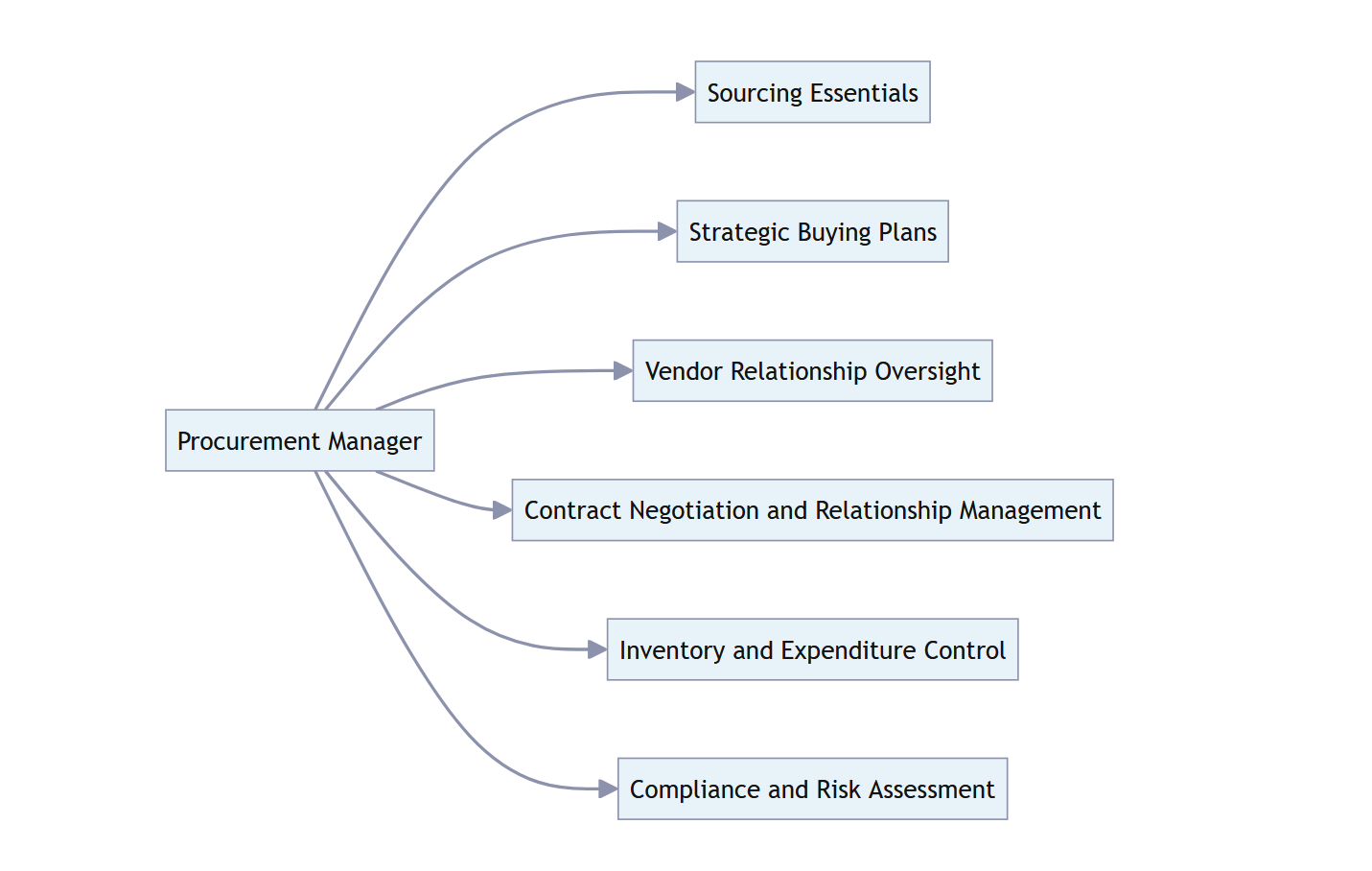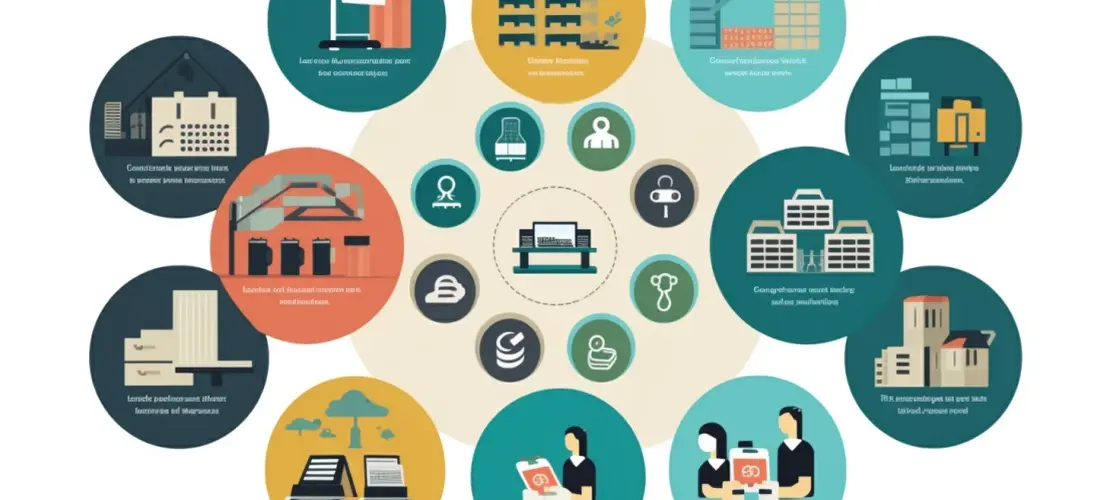A procurement manager plays a crucial role in businesses, overseeing the acquisition of goods and services necessary for smooth operations. Their job goes beyond mere purchasing; it involves strategic planning to align acquisitions with company goals, focusing on quality and budget management.
The value of a procurement manager lies in their ability to ensure timely, cost-effective, and quality procurement of essential materials and services. Their work is central to maintaining a business's competitive advantage, controlling costs, and promoting efficient operations.
Procurement Manager: Roles and Responsibilities
Sourcing Essentials
The primary task of a procurement manager is to find and obtain necessary products and services. They must select suitable suppliers to meet the organization's needs.
Strategic Buying Plans
These managers create and execute buying strategies. These strategies must support the organization's goals, balancing cost, quality, and timelines.
Vendor Relationship Oversight
Managing vendor and supplier relationships is vital. Procurement managers assess vendor performance and ensure adherence to agreements.
Contract Negotiation and Relationship Management
They possess strong negotiation skills. Their goal is to secure contracts that benefit their organization, focusing on cost-effectiveness, quality, and timely delivery.
Inventory and Expenditure Control
They are in charge of inventory management and spending control. This is essential for maintaining operational efficiency and financial health.
Compliance and Risk Assessment
Procurement managers ensure all procurement actions are legally compliant. They identify and address potential risks in procurement processes.
Procurement Manager Job Profile
Education and Professional Background
To become a procurement manager, you usually need a bachelor's degree. The most relevant fields are business, supply chain management, or something similar. It's also a good idea to get professional certifications related to procurement or supply management.
Skills Needed
The main skills for this job are being good at analyzing, negotiating, planning, and communicating. Analytical thinking helps in understanding complex procurement processes. Effective negotiation is crucial for dealing with suppliers. Strategic planning is needed to align procurement strategies with business goals. Strong communication skills are essential for working with different teams and suppliers.
Career Growth
As a procurement manager, you can move up to senior management positions. In these roles, you'll have more influence over the wider business strategies of your company.
Challenges and Opportunities
Procurement managers often deal with uncertain markets and issues in the supply chain. However, these challenges come with chances to find new ways to save money and make the procurement process more efficient. By handling these challenges well, you can make a big impact on your company's success and bottom line.
Cross-Functional Collaboration
A procurement manager needs to work well with different parts of the company like finance, operations, sales, marketing, and IT. It's important to understand what each department needs to buy the right things.
Clear Communication
They must explain their buying decisions and plans clearly to everyone in the company, from their team to top bosses. Good communication helps make sure that buying stuff helps the whole business run better. This means making sure that what they buy fits with the company's main goals and keeps everyone on the same page.
Strategic Aspects
Strategic Sourcing
Strategic sourcing is key to cutting costs and raising product quality, which helps the company's profits. It involves carefully choosing suppliers and negotiating deals that are cost-effective and maintain or improve quality.
Balancing Costs and Quality
Procurement managers have a big job: they have to reduce costs without sacrificing quality. This means finding the best deals that provide good value.
Boosting Supply Chain Performance
Good procurement strategies make the whole supply chain work better. This leads to smoother operations and plays a big role in the company's success. By making smart buying choices and managing suppliers well, procurement managers can make the entire supply chain more efficient.
Technology and Data Analysis: Vital for Procurement Managers
In procurement, technology and data analysis are crucial. They provide clear insights into market trends, spending habits, and supplier performance. This is achieved through supply chain management software, various digital systems, and robust analytics tools.
For procurement managers, using data effectively is key to making accurate predictions, managing risks, and identifying cost-saving opportunities. Technology streamlines the procurement process, enhances precision, and allows for real-time tracking of orders and inventory. A procurement manager must stay up-to-date with emerging technologies and apply them effectively. It leads to increased efficiency, reduced costs, and a competitive edge in the market.
How to Use Tech and Data Right
- Choose Right Tools: Pick technology that fits the business's needs.
- Train Your Team: Make sure everyone knows how to use these tools.
- Keep Data Clean: Use accurate and relevant data for decisions.
- Automate Simple Tasks: Use tech to handle routine jobs.
- Connect Systems: Make sure all tech works well together.
- Protect Data: Keep procurement information safe and follow legal rules.
- Check Performance: Regularly review how things are going using data.
- Manage Vendors with Tech: Track how well suppliers are doing.
- Listen and Adjust: Get feedback and improve your tech use.
By doing these, procurement managers can use technology and data analysis effectively.
Upgrading Procurement with New Tech
Simple Tools for Better Buying
Procurement has changed a lot with new digital tools. RFP Management systems and Vendor Analysis platforms are important here. RFP software makes it easier to ask for and compare bids from suppliers, helping pick the best one. Vendor Analysis tools give a clear picture of a vendor's quality, trustworthiness, and rule-following, helping managers choose wisely.
There are other tools changing how we buy things too:
- E-Procurement Systems: These handle everything from making orders to paying bills, making tracking easier, clearer, and faster.
- Cloud-based Procurement: These systems can be used from anywhere, which is great for businesses that work across different places.
- Contract Management Software: This helps manage contracts from start to finish, making sure rules are followed, tracking how contracts are doing, and reminding about renewals.
- Data Analytics: Making Smarter Decisions
Data Analytics is now a big part of making decisions in procurement. It looks at how money is spent, how suppliers do, and what's happening in the market. This helps find where money can be saved, spots trends, and plans for the future.
Data Analytics gets even better with new technologies:
- Predictive Analytics: Uses past data to guess future trends, helping in planning and avoiding risks.
- AI and Machine Learning (ML): These smart systems look at lots of procurement data to find patterns and foresee risks with suppliers.
- Internet of Things (IoT): IoT devices watch the supply chain as it happens, helping manage stock better and keep things running smoothly.
Frequently Asked Questions about Procurement Manager
What are the 4 main roles of procurement?
The four key roles are sourcing goods and services, negotiating contracts, managing supplier relationships, and ensuring the smooth flow of goods and services into the organization.
What does procurement management do?
Procurement management involves overseeing the acquisition of goods and services for an organization. This includes selecting suppliers, negotiating contracts, and managing purchase orders.
Is a procurement manager a good job?
Yes, it can be rewarding and offers career growth, involvement in strategic decision-making, and opportunities to impact an organization's efficiency.
Is procurement manager a stressful job?
It can be challenging due to tight deadlines and budget constraints, but effective planning and communication skills can help manage the stress.
What are the qualifications for a procurement manager?
Typically, a bachelor's degree in business, supply chain, or a related field is required. Experience in procurement or a related area is also beneficial.
What do procurement managers do?
They oversee the process of acquiring goods and services, including sourcing, negotiating contracts, and managing supplier relationships.
What are procurement jobs responsibilities?
Responsibilities include identifying sourcing opportunities, negotiating contracts, managing suppliers, and ensuring cost-effective purchases.
What is a procurement manager job description?
A procurement manager's job description includes managing the procurement process, developing strategies, overseeing staff, and ensuring cost-effective purchasing.
What are the main duties of a procurement officer?
Key duties include sourcing suppliers, negotiating contracts, managing purchase orders, and maintaining good supplier relationships.
What are the five key responsibilities of procurement management unit?
These are strategic planning, supplier management, contract negotiation, cost management, and quality assurance.
What is the main responsibility of procurement manager?
The main responsibility is to ensure that the organization obtains quality goods and services at the best value.
What does an IT procurement manager do?
They focus on acquiring IT-related products and services, negotiating with tech suppliers, and managing IT contracts.
What is the role of procurement manager?
The role involves overseeing all aspects of procurement, from planning and sourcing to supplier management and contract negotiation.
What is a procurement manager?
A procurement manager is a professional responsible for acquiring goods and services needed by their organization in a cost-effective and efficient manner.
How can a purchasing manager solve common challenges of the profession?
By staying informed about market trends, building strong relationships with suppliers, and adopting efficient procurement software and technologies.
What are the Steps of the Procurement Process?
Steps include need identification, supplier research and selection, price negotiation, purchase order issuance, delivery, and payment processing.
Looking for more job descriptions besides Procurement Manager job description?
Many other job descriptions are available, each detailing specific roles and responsibilities in different fields.
How to use this Procurement Manager job description template?
Adapt it to your needs, highlighting particular skills, experiences, and qualifications relevant to your organization.

















